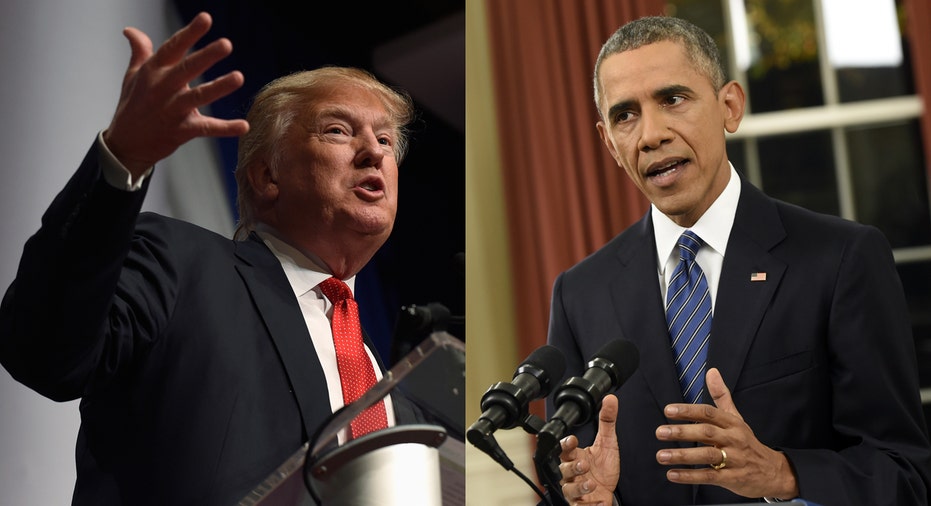What Trump and Obama Have in Common

When Donald Trump stood in his eponymous tower and officially announced that he’s running for president, it was hard to take the guy seriously at first. After all, The Donald has a flare for theatrics and this was not the first time he’d threatened to throw his hat into the political arena.
But a few minutes into his speech, it was clear that this event was not staged for reality TV, but for real. “If I get elected president,” Trump said, “I will bring it back bigger and better and stronger than ever before, and we will make America great again.”
You could hear the conviction in his voice and know that he meant every word.
“Our country is in serious trouble,” he continued, “We are not respected by anyone. Our enemies are getting stronger and we are getting weaker. Politicians are all talk and no action. They will never be able to fix our country … and I cannot sit back and watch this incompetence any longer.”
As I listened to Trump score point after point in a bold, if not brutal, takedown of the political leaders who brought us to this sorry state, I knew his message would resonate with many Americans as it was resonating with me.
But the real estate mogul was just getting started. “We have people that aren't working. We have people that have no incentive to work,” he said, “But they're going to have incentive to work, because the greatest social program is a job. And they'll be proud, and they'll love it.”
He was downright inspiring. I almost stood up and shouted “hallelujah” at the TV.
Unfortunately, Trump can only go so long before his enormous ego takes over, and he proclaimed, “I will be the greatest jobs president that God ever created.” And just like that, the magic of the moment was gone. There again stood The Donald – a pompous reality TV star with the bad comb-over. It wouldn’t have surprised me if the next words out of his mouth were “You're fired.”
At that moment, and many since that day in June, I was reminded of a particularly concerning aspect of Trump that’s simply impossible to ignore: His stunning lack of humility. The man is as arrogant as they come.
When Trump is boastful to the extreme, it doesn’t much matter if he’s right or wrong. It doesn’t make a bit of difference whether he’s shooting straight or making it up on the fly, as he sometimes does. When we hear a self-satisfied leader hoist himself up on a pedestal, it doesn’t just rub us the wrong way – it sends up a red flag.
It may not be exactly the same red flag we’ve noticed time and again from Barack Obama – the president whose natural response to criticism of his failed policies is to act defensively and defiantly double down. But at the same time, it appears to represent an extreme level of hubris at its core.
If that’s not enough to convince you that there are similarities, Fox News senior political analyst Brit Hume once said of President Obama, “This is a man who told someone I know, ‘Wouldn’t it be great for the world if I were president’.” If that doesn’t sound in any way like Trump, you're just not paying attention.
Trump’s supporters would probably say that the multibillionaire with an enormous real-estate empire and a personal brand known around the globe has a right to be arrogant. Few entrepreneurs can claim his level of success. That may be true, but success can be its own worst enemy, especially for those who lack humility.
In his breakout book, Only the Paranoid Survive, former Intel CEO Andy Grove wrote, “Success contains the seeds of its own destruction.” In other words, success has self-limiting properties. It’s extremely dangerous to think you have all the answers because you’ve been successful in the past.
In his bestselling book What They Don’t Teach You at Harvard Business School, Mark McCormack defined what he called the “Business Paradox” as “the better you think you are doing, the greater should be your cause for concern; the more self-satisfied you are with your accomplishments, your past achievements, your ‘right moves,’ the less you should be.”
He goes on to say that a key characteristic of every true champion he’s ever known is a “profound sense of dissatisfaction with their own accomplishments.”
Meanwhile, Charles Koch, long-time CEO of Koch Industries – the nation’s second-biggest private company with sales of $115 billion and 100,000 employees – hammered home the importance of humility in a recent Fox News interview:
“Hubris, arrogance is just one step ahead of loss of integrity,” he said. “Because if you think you’re better than other people, you know more, then you’re going to think as many leaders have that the rules don’t apply to them. So they lose their integrity.”
Koch said that, when his father turned the reins of the company over to him, he said, “I hope your first deal is a loser. Otherwise you’ll think you’re a lot smarter than you are.”
To this day, humility remains a key guiding principle of Koch Industries’ culture and Koch’s words echo those of Grove and McCormack, “Success is one of the worst enemies of success,” he said, “Because success tends to breed complacency and lack of humility.”
Look, I’m not saying Trump can’t be an effective president, just making an observation that, for me and I suspect many others, is concerning. And if by chance his arrogance is just part of the act, a little genuine humility would go a long way toward making him more trustworthy, likeable, and electable.



















